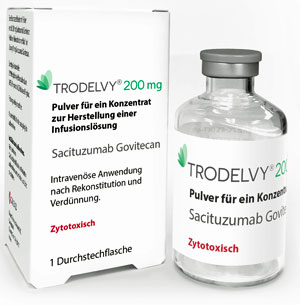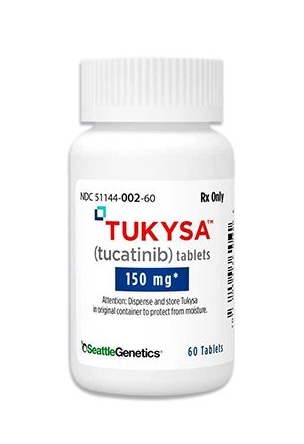Trodelvy (sacituzumab govitecan-hziy) vs Tukysa (tucatinib)
Trodelvy (sacituzumab govitecan-hziy) vs Tukysa (tucatinib)
Trodelvy (sacituzumab govitecan-hziy) is an antibody-drug conjugate specifically approved for the treatment of metastatic triple-negative breast cancer (TNBC) after at least two prior therapies for metastatic disease, and it works by delivering a chemotherapy drug directly to the cancer cells. Tukysa (tucatinib), on the other hand, is a tyrosine kinase inhibitor used in combination with trastuzumab and capecitabine for the treatment of HER2-positive breast cancer, including patients with metastatic disease or those who have received one or more prior anti-HER2-based regimens in the metastatic setting. The choice between Trodelvy and Tukysa would largely depend on the specific type of breast cancer a patient has (triple-negative versus HER2-positive) and their previous treatments, as each medication targets different pathways and receptors that are expressed in these distinct breast cancer subtypes.
Difference between Trodelvy and Tukysa
| Metric | Trodelvy (sacituzumab govitecan-hziy) | Tukysa (tucatinib) |
|---|---|---|
| Generic name | Sacituzumab govitecan-hziy | Tucatinib |
| Indications | Metastatic triple-negative breast cancer (mTNBC), Metastatic urothelial cancer | HER2-positive breast cancer |
| Mechanism of action | Antibody-drug conjugate targeting TROP-2 | Tyrosine kinase inhibitor targeting HER2 |
| Brand names | Trodelvy | Tukysa |
| Administrative route | Intravenous | Oral |
| Side effects | Neutropenia, diarrhea, nausea, fatigue, anemia, vomiting, alopecia, constipation, decreased appetite, rash | Diarrhea, palmar-plantar erythrodysesthesia, nausea, fatigue, hepatotoxicity, vomiting, stomatitis, decreased appetite, anemia, rash |
| Contraindications | Severe hypersensitivity to sacituzumab govitecan-hziy | Severe hypersensitivity to tucatinib |
| Drug class | Antibody-drug conjugate | Tyrosine kinase inhibitor |
| Manufacturer | Gilead Sciences, Inc. | Seagen Inc. |
Efficacy
Trodelvy (sacituzumab govitecan-hziy) Efficacy in Breast Cancer
Trodelvy (sacituzumab govitecan-hziy) is an antibody-drug conjugate specifically indicated for the treatment of adult patients with metastatic triple-negative breast cancer (TNBC) who have received at least two prior therapies for metastatic disease. The efficacy of Trodelvy was evaluated in a study known as IMMU-132-01, a multicenter, single-arm trial that included 108 patients with metastatic TNBC. In this study, Trodelvy demonstrated a significant clinical benefit, with an objective response rate (ORR) of 33%, including a 4% complete response rate. The median duration of response was 7.7 months, indicating a substantial period of disease control for patients with this aggressive form of breast cancer.
Further confirming its efficacy, Trodelvy was also assessed in the ASCENT study, a phase 3 trial that compared Trodelvy to chemotherapy chosen by the patient's healthcare provider in patients with relapsed or refractory metastatic TNBC. The results showed a significant improvement in progression-free survival (PFS) and overall survival (OS) for patients treated with Trodelvy. The median PFS was 5.6 months with Trodelvy compared to 1.7 months with chemotherapy, and the median OS was 12.1 months versus 6.7 months, respectively.
Tukysa (tucatinib) Efficacy in Breast Cancer
Tukysa (tucatinib) is a kinase inhibitor used in combination with trastuzumab and capecitabine for the treatment of adult patients with advanced unresectable or metastatic HER2-positive breast cancer, including patients with brain metastases, who have received one or more prior anti-HER2-based regimens in the metastatic setting. The efficacy of Tukysa was demonstrated in the HER2CLIMB trial, a randomized, double-blind, placebo-controlled study. Patients receiving Tukysa in combination with trastuzumab and capecitabine had a significant improvement in progression-free survival compared to those receiving placebo with trastuzumab and capecitabine. The median PFS was 7.8 months in the Tukysa arm versus 5.6 months in the placebo arm.
Additionally, Tukysa showed efficacy in patients with brain metastases, a group that is often excluded from clinical trials and has limited treatment options. In the subgroup of patients with brain metastases, the median PFS was 7.6 months for those treated with Tukysa compared to 5.4 months for those on placebo. Overall survival was also improved, with a median OS of 21.9 months in the Tukysa group compared to 17.4 months in the placebo group, highlighting the potential of Tukysa to address a significant unmet need in this patient population.
Regulatory Agency Approvals
Trodelvy
-
European Medical Agency (EMA), European Union

-
Food and Drug Administration (FDA), USA

Tukysa
-
European Medical Agency (EMA), European Union

-
Food and Drug Administration (FDA), USA

-
Health Canada

-
Therapeutic Goods Administration (TGA), Australia

-
Swissmedic (CH)

Access Trodelvy or Tukysa today
If Trodelvy or Tukysa are not approved or available in your country (e.g. due to supply issues), you can access them via Everyone.org.
How it works

Make an enquiry
Choose the medicine you want to buy, answer a couple of questions, and upload your prescription to speed things up. We’ll get back to you within 24 hours.


Make an enquiry
Choose the medicine you want to buy, answer a couple of questions, and upload your prescription to speed things up. We’ll get back to you within 24 hours.


Breeze through the paperwork
We'll guide you through the required documents for importing unapproved medicine, ensuring you have all the necessary information.


Get a personalized quote
We’ll prepare a quote for you, including medicine costs and any shipping, administrative, or import fees that may apply.


Receive your medicine
Accept the quote and we’ll handle the rest - sourcing and safely delivering your medicine.

Some text on this page has been automatically generated. Speak to your physician before you start a new treatment or medication.
Let's talk
If you have any questions, call us or send us a message through WhatsApp or email:
Contact us




